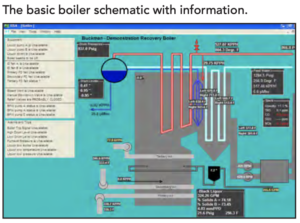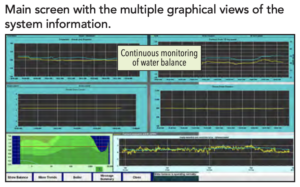The Importance of Effective Leak Detection in Recovery Boilers

Recovery boilers play an integral part in pulp and paper process. Being able to recycle the chemicals in black liquor by using it as fuel for the boiler helps to make paper and pulp mills economically viable. But due to their unique design, recovery boilers are different from other types of boilers. If a leak causes water to come into contact with a recovery boiler’s smelt bed, it can result in a catastrophic explosion that can hurt or kill mill employees and cause hundreds of thousands, if not millions, of dollars in damage and lost productivity. For this reason, leak detection should be a high priority for all mill utilities staff working with recovery boilers.
Recovery boilers are large, complex systems, and understanding them and knowing the difference between what’s normal behavior and what’s not can require years of experience. With the combined pressures of companies pushing harder to get the most out of aging equipment and a brain-drain on the industry from experienced employees retiring, boilers are being run by newer employees who may not have the hands-on experience to know the difference between an anomaly that could be a leak and a false alarm.
False alarms destroy confidence
When a recovery boiler has to implement an emergency shutdown procedure (ESP), it can be very expensive (~$500,000 and up) and halt production for days. In most cases, your operators haven’t been able to easily and confidently simulate recovery boiler leak scenarios, which prevents building confidence over time. And when operators don’t have full confidence—either in the leak-detection system or in themselves to interpret situations—it can quickly become a very stressful situation. Should they do an ESP, which, if unwarranted, could cost lost productivity? Or do they keep the boiler running and risk the safety of employees and equipment?
If your system is built around third-party proprietary instruments that need constant cleaning and calibration, you’re more likely to experience drift that can give mill operators a false sense of security and compound your false-alarm problem. Having a system in place that can accurately detect when a potential leak might be occurring provides an opportunity for early detection, which could allow you to address a situation before it causes damage. Advance warning also gives you the option of a controlled shutdown, possibly on a weekend—a far less-expensive alternative to an ESP.
Buckman’s Recovery Boiler Advisor can help counter the loss of institutional knowledge
Well-informed operators are much more likely to make the right decision when they have accurate data at their fingertips. Buckman’s Recovery Boiler Advisor (RBA) is a comprehensive leak-detection system that helps operators decide on the need to perform an emergency shutdown procedure because of a tube leak. The system’s sensitivity ranges between 0.15% and 0.5% of the normal feedwater flow to the boiler, depending on the availability and consistency of boiler instrumentation.
When you partner with Buckman, you can adjust analytic sensitivity over time to make smarter decisions about leaks based on a combination of historical and real-time data. RBA is built on a unique learning algorithm, which analyzes data over many months to create a pattern of normal operation—and automatically makes adjustments to correct for instrument drift. What’s more, your operators can view this data and adjust alert parameters to be either more or less sensitive, so you can proactively avoid false alarms. This means your leak detection will continually get more accurate over time, which increases operator confidence and empowers them to make the right decisions when and where needed.
Go beyond surface observations and take confident action
Most leak-detection systems rely heavily on one type of real-time data to find anomalies (e.g., acoustic signals, chemical balance, etc.). Yet while that information can be important, it’s only a portion of all the elements that can influence—and predict—a leak. When you partner with Buckman, you’ll go beyond the surface-level observations—seeing more of what’s happening in the boiler, so your operators can be focused and fast in their decision-making.
 RBA analyzes more parts of the boiler than any other system—variables like fan speeds, CO2 and sulfur levels, opacity and more. And because RBA builds a contextual, real-time story of symptoms happening within the boiler, your operators can quickly build a strong case for why they should take a given action—whether that be business as usual, a physical investigation or an ESP. With this kind of comprehensive analysis, you’ll not only increase operator confidence and awareness of common symptoms, but also minimize employee exposure to potentially dangerous areas and situations.
RBA analyzes more parts of the boiler than any other system—variables like fan speeds, CO2 and sulfur levels, opacity and more. And because RBA builds a contextual, real-time story of symptoms happening within the boiler, your operators can quickly build a strong case for why they should take a given action—whether that be business as usual, a physical investigation or an ESP. With this kind of comprehensive analysis, you’ll not only increase operator confidence and awareness of common symptoms, but also minimize employee exposure to potentially dangerous areas and situations.
Detect leaks by monitoring only your equipment
With most leak-detection systems, you have to install hardware and equipment, run cables and wires, connect sample and cooling lines, etc.—some of which require a boiler to be offline. And when these assets inevitably need cleaning or calibration, you’re often at the mercy of the vendor technician’s availability—which can bottleneck your production schedule.
With RBA, you’ll detect leaks using just the equipment and instruments you already know and understand—bypassing the usual implementation and maintenance headaches. This is because RBA has no physical footprint; it doesn’t need extraneous sensors, chemical feeders or acoustic monitors to operate—just a server to run on and a connection to your distributed control system (DCS). This means you’ll avoid costly boiler downtime for installation, and your operators won’t have to learn and manage extraneous equipment or chemicals. They will view the critical parameters for leak detection on one dashboard. In essence, you’ll minimize complexity and increase monitoring confidence—while maintaining full control of your operational destiny.
Take the emotion out of it
 A system such as RBA also eliminates the emotional factor from decision-making by fostering a trusted relationship between operators and the system. This is because RBA includes a variety of learning resources. Operators can watch training videos from the “Help” menu for just-in-time learning; review checklists of possible false alarms and leak symptoms; and replay historical leak events to better understand what really happened. They can even manipulate system data to simulate a leak and its downstream consequences in a safe environment. All these resources not only build trust and alignment, but also make your entire operational team better prepared for real events, so they can act decisively with confidence.
A system such as RBA also eliminates the emotional factor from decision-making by fostering a trusted relationship between operators and the system. This is because RBA includes a variety of learning resources. Operators can watch training videos from the “Help” menu for just-in-time learning; review checklists of possible false alarms and leak symptoms; and replay historical leak events to better understand what really happened. They can even manipulate system data to simulate a leak and its downstream consequences in a safe environment. All these resources not only build trust and alignment, but also make your entire operational team better prepared for real events, so they can act decisively with confidence.
A safety investment paid for from your utilities budget
With more than a decade of development by a consortium of industry experts, Buckman’s RBA is the industry standard for identifying potential leaks in a mill’s recovery boiler. RBA does not control boilers—that responsibility falls to the operators running them. But it can provide them with critical information, in real time, to make informed decisions and keep your mill running safely and profitably. Think of it as a safety investment that comes out of your utilities budget. For more information or a demonstration in your mill, contact your local Buckman representative or visit our website.
Buckman’s Recovery Boiler Advisor
Read the Brochure | Read the Key Facts & Figures | Watch the Video | View the Infographic | Visit the Website